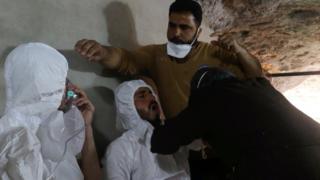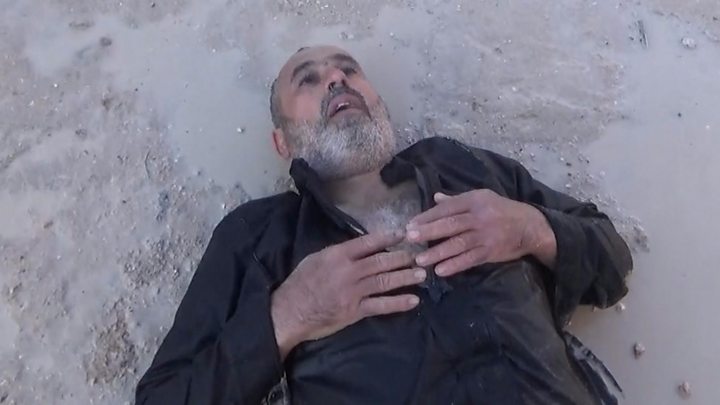

Russia has vetoed a UN Security Council resolution that would have extended an international inquiry into chemical weapons attacks in Syria.
It is the 10th time Moscow has used its veto powers at the UN in support of its ally since the conflict began.
US ambassador to the UN, Nikki Haley, accused Russia of undermining the organisation’s ability to deter future chemical attacks.
The Russian ambassador dismissed the criticism.
The Joint Investigative Mechanism (JIM) was set up in 2015 to identify perpetrators of chemical attacks. It is the only official mission investigating the use of chemical weapons in Syria.
Moscow strongly criticised the inquiry when it blamed the Syrian government for a deadly nerve agent attack on the town of Khan Sheikhoun in April. Syria denies using banned chemical weapons.
- Why is there a war in Syria?
- Syria chemical ‘attack’: What we know
- Syria ‘still producing chemical weapons’
Mrs Haley described the latest Russian veto as “a deep blow”.
“Russia has killed the investigative mechanism which has overwhelming support of this council,” she said.
“By eliminating our ability to identify the attackers, Russia has undermined our ability to deter future attacks.”
What is the Joint Investigative Mechanism?
- Created in 2015 with unanimous backing from the UN Security Council and renewed in 2016 for another year
- Involves the UN and the Organisation for the Prohibition of Chemical Weapons
- Has previously concluded that Syrian government forces used chlorine as a weapon at least three times between 2014 and 2015
- It has also found that Islamic State militants used sulphur mustard in one attack.
The Security Council rejected a Russian-drafted resolution to extend the inquiry but with changes to membership of the panel. The draft also called for the panel’s findings on Khan Sheikhoun to be put aside.
Russian ambassador Vassily Nebenzia said it was Western countries who had sabotaged the inquiry.
“Some council members refused to support our draft and now they have full responsibility for terminating the JIM,” he said.
“This just proves again that the anti-Damascus fever is the only real priority for them and that they have manipulated the JIM for their own purposes.”
Japan later tabled a draft resolution that would extend the JIM for another 30 days, as opposed to the one-year extension in the US-written draft blocked by Russia. The council was due to vote on the new resolution later on Friday.
Russia, the UK, China, France and the US all have veto powers at the Security Council.
The attack on Khan Sheikhoun in April left more than 80 people dead and prompted the US to launch missile strikes on a Syrian airbase.
Last month a UN Human Rights Council inquiry concluded a Syrian air force jet was responsible, dismissing statements from Russia that the jet had dropped conventional munitions that struck a rebel chemical weapons depot.
Syrian President Bashar al-Assad has said the incident in Khan Sheikhoun was a “fabrication”.


